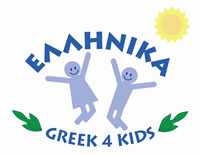MISSION & PHILOSOPHY
OUR MISSION:
Inspiring students to excel.
To help families of Greek and non Greek ancestry and backgrounds raise bilingual children, starting at an early age, by offering a challenging, high quality, and developmentally appropriate curriculum.
To provide a learning environment enriched by the teaching of the Greek Language, History, Culture, Faith where each student develops his or her own talents and potential to the fullest.
To reinforce cultural awareness and to instill a sense of pride in younger generations by promoting Greek language and culture. To encourage the preservation of the Greek ethnic heritage in the diverse and multicultural American society.
To create a school community of people who value Greek Paideia and create a partnership with the School so the above mission statements are met.
TEACHING PHILOSOPHY & METHODOLOGY:
Greek through language arts, creative arts, music and play.
Children are naturals at language learning: their lack of inhibition and adaptability makes it easier for them to pick up sounds and words. During the earliest years of a child’s life the most significant brain development takes place. The plasticity of a child’s brain is at its maximum. The interest of children to know the world is also the motive for learning. When children feel safe in a stimulating environment, they want to explore it with their senses, develop ideas and structure knowledge.
As a parent, you are offering your child a life-long advantage by exposing him/her to a foreign language at an early age. Besides providing a head start for their future language learning and building their self-confidence, they benefit from a proven boost to scholastic performance in other subject areas by developing their learning skills.
Language is to be taught hand in hand with culture. Our curriculum draws from the Modern Greek culture, rich Hellenic and Greek Orthodox heritage and traditions to compliment the home by promoting optimal cognitive, physical, social, and emotional development.
Greek 4 Kids operates on the philosophy that young children learn best through direct sensory experiences that encourage self-expression. The School provides experiences to meet children’s needs and stimulate learning in all developmental areas – physical, social, emotional, and intellectual. Its philosophy draws upon the best practices of the child-development tradition in early childhood education. Play is a major component of the program, combined with activities such as: storytelling, reading stories, arts and crafts, music and creative movement, singing, puppetry, games.
Greek 4 Kids takes into consideration the individuality of each child, interests and needs. The School places special emphasis on social and language development in two languages and sets asobjectives the intellectual and emotional development of children with classroom experiences that will help them realize their full potential in learning another language.
Emphasis is given on communication – that is, students are encouraged to express themselves in Greek. Grammar is a tool, but not a goal.
Research shows that children have the mental flexibility to acquire a new language with a native or near-native accent, provided that they have native teachers as models. Greek 4 Kids’ teachers are native speakers of Greek. Therefore, students are always in contact with authentic Greek and excellent pronunciation, presented in a participatory environment.
The School uses authentic teaching materials developed for the teaching of Greek as a second or foreign language. Older children use age and level appropriate textbooks and worksheets targeting their interests and abilities.
Since young children have a rather short attention span and learn best when they are actively involved in physical activities the curriculum is structured to provide ample opportunities for movement and oral practice. They are always encouraged to participate in simple conversations, both teacher-to-child and child-to-child.
For children to become engaged, classes must be fun and fast moving. Children need to be constantly stimulated and alert. Activities are selected to appeal to different learning styles: listening to stories, coloring pictures, manipulating objects, mimicking and acting out songs, playing language games, identifying flash cards, and (for older children) learning to read and write. Teachers use communicative games and primary school techniques for a practical and fun use of Greek.
Criteria for class placement are age and competencies in all fields of communication.
